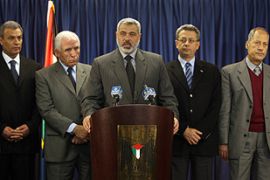Fatah intelligence officer killed
Palestinians hope unity deal will end factional fighting and ease sanctions.

Parliament challenges
The Palestinian parliament is preparing for a vote to approve the make-up of the new unity government but obstacles remain to create a viable, working parliament.
| Your Views |
|
“This is just a ploy to regain international hand-outs with smoke and mirrors” LeotheIsaurian, Detroit, US |
Parliamentarians are split up into three areas, and even the newly formed cabinet may be forced to meet via videophone.
Some members, including Haniya are based in Gaza. Israel‘s occupation prevents them from traveling to the West Bank, forcing other parliamentarians to come to them.
Among those located in Ramallah in the West Bank is Azzam al-Ahmad, the deputy prime minister.
The absence of a unified and sovereign Palestinian territory because of the occupation means there is also no capital city in which all members can physically gather together.
Further complicating the issue, 40 members of parliament are still currently being held in Israeli prisons.
Four out of the total are ministers in the outgoing government. And although eight were detained prior to the elections, they ran and won from jail.
Thirty-two Palestinian ministers were arrested after the elections.
Ahelbarra, said: “Palestinians are very much aware of the political realities that have created this unique geographic situation.
“They’re hoping that once the political process kicks off, they will get more international support, more regional support, which would press the Israelis to take into account … that a failure could be a blow to everybody in this part of the world.”
Israeli rejection
Israel has so far rejected the proposed administration, which it says doesn’t recognise Israel‘s right to exist, and hasn’t renounced violence.
On that basis, Israel‘s urging the West to maintain an aid boycott against the Palestinians and will continue to withhold Palestinian tax revenue.
For more than a year, different Palestinian sectors have been affected by the blockade. Civil servants went on a strike for more than four months before the Hamas-led government started paying them partial salaries.
Amin Abu Soud, a civil servant, said: “We hope as employees that the government will be able to secure the funds that will enable payment of our salaries.”
The Palestinian private sector has also been affected and businesses maintain low expectations.
European aid
 |
| The EU commissioner said aid will be extended if Palestinians meet EU conditions [Al Jazeera] |
The European Union allocated 300m euros ($396m) for assistance to the Palestinians but only 180m was paid to certain Palestinian sectors through a temporary international financial mechanism.
During her recent visit to Ramallah, Benetta Ferero-Valdner, an EU commissioner, made a contribution for those classified as social hardship cases, saying the contribution may be extended if the unity government meets certain conditions.
Ferero-Valdner said: “This depends on how this national unity government will do its program and actions. There are certain principles that we all have to meet, these principles we hope that the unity government will commit itself to them.”
Recognising Israel, denouncing “terror” and recognising agreements signed between the Palestinian Liberation Organisation and Israeli are the three conditions the unity government needs to meet.